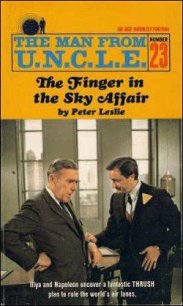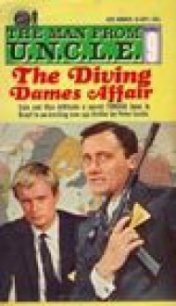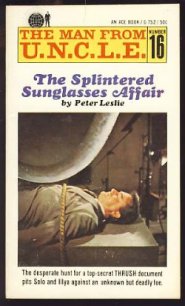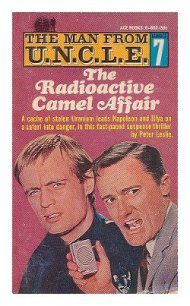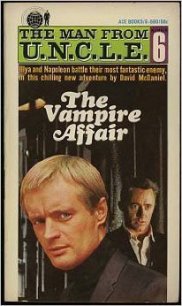The Unfair Fare Affair - Leslie Peter (книги онлайн полностью бесплатно .txt) 📗
At once the door slammed shut, blanking out the light completely. But before he had time to be surprised, electric lights blazed on and he found himself facing a girl. "Mr. Napoleon Solo, I believe?" she said politely.
She was flaxen-haired, with a pink face and a tip-tilted nose. She wore an ice-blue sweater, that matched her eyes and tall brown boots with a very short skirt. Her hips were slender and there was a provocative twist to her mouth. Her age, Solo judged, was about twenty-two.
"Hi there!" he said. "What a pleasant surprise! I believe Mr. O'Rourke is expecting me."
"Mr. O'Rourke?" the girl said. Her voice was slightly husky.
"Habib Tufik, then, if he likes that better."
"He doesn't like you to use either of those names," the girl said severely. "Please remember to use his correct name when you see him."
'And that is?" Solo was amused.
"Mynheer Hendrik van der Lee."
The agent grinned. "Good old Hendrik," he said softly. "I'll try hard not to forget… and talking about unforgettable names, what's yours?"
"You may call me Annike," the girl said. "If you would please follow me..."
She insinuated herself between a stack of planks and the wall, reaching out with one arm. Evidently there was a hidden switch there, for a moment later there was a quiet whine of hydraulics, and a section of wall behind the oil drums rumbled aside. Beyond the opening, a vaulted passageway led back beneath the road.
Annike went through and waited for Solo to follow. Two yards down the passage, they broke a magic-eye beam trained from one wall to the other, and the secret door swung shut behind them.
The corridor was brightly lit, brick built, and floored with rubber composition tiles. Their footsteps hardly made a sound—and the wheelchair, Solo reflected, would have been virtually noiseless. When they had gone a distance that he estimated would have taken them under the road and beyond the row of houses bordering it, the corridor turned sharply right and stopped by a blank wall. The final section of tiling on the floor was outlined by a narrow crevice as though it were a trapdoor. The girl stepped on this square and motioned Solo to follow her once more.
As soon as he was standing beside her, she reached out and pressed the end of one of the bricks set in the wall. Again there was the whine of machinery, and the section of floor, complete with the ceiling above it, rose slowly on a hydraulic ram.
The platform lifted them a distance of about fourteen feet and stopped. On three sides they were enclosed by brick work. In the fourth wall was what looked like an ordinary door. The girl opened it and they walked out into a luxuriously furnished bedroom.
They must be on the ground floor of a house in the row behind those with the half doors, Solo thought, a house whose official entrance was no doubt on another street altogether. From the room, the elevator now looked just like a rather large built-in cupboard that happened to be empty. Nothing would show either, he was certain, when it was at the lower position: what was now the ceiling of the cupboard would become the floor, and another ceiling would have lowered it self to replace the first one.
Closing the door, Annike led him through a screen of heavy velvet drapes masking an archway. In the huge room beyond, Solo at once felt at home.
Gray steel filing cabinets were ranged around three of the walls, and on a bench projecting from the fourth the chassis of radio transmitters and receivers crowded up against the amplifiers and speakers and matched spools of a sophisticated tape deck ensemble. In the center of the room was a board room table big enough to seat twenty people, its polished top almost submerged in a tide of newspapers, magazines, handouts and information sheets stacked in piles twelve to fifteen inches high. And there were great heaps of journals, too, mixed up with floods of newspaper cuttings and dozens of sheets of paper covered with scribbled notes, on the chairs, over the coffee tables, and on every available inch of horizontal space in the room. In one corner was a closed-circuit television screen.
The place looked, in short, exactly like Tufik's head quarters in Casablanca and Rio de Janeiro, both of which Solo had known. Even the complicated console controlling the tape equipment, with its switches and dials and rheostats and its twelve-channel mixer, was the same.
Like a pale spider in one corner of its web, the fat man himself was waiting for them on the far side of the room.
"Mr. Solo! Mr. Solo!" he cried delightedly as they pushed through the curtain. " 'Tis a pleasant surprise indeed to be seeing you! Come on in and sit you down at once, while I see about fixing you some liquid refreshment!"
With all his old expertise, Tufik whisked the chair in between tables, chairs and stacks of books, to roll up to the agent with outstretched hand.
"Well, you old rascal," Solo said affectionately, grasping the fat but surprisingly sinewy fingers, "and what have you been up to? What are you doing in Holland, for heaven's sake? I thought you'd settled for good in South America!"
"For good?" the Moroccan-Irishman echoed. " 'Twas an uneasy marriage at all... and that bein' so, I looked at the for-good-or-for-ill part of the contract and decided there was too much ill and not enough good. So a divorce, you might say, was arranged and I came here. No but seriously, look, there was too many revolutions and coups d'etat and I don't know what-all else over there. A man couldn't keep track of who was who!"
He broke off and looked at the girl. "Perhaps you'd be kind enough, my dear, to bring Mr. Solo and myself a small jar of the creature," he said.
She nodded and disappeared through a doorway at one side of the radio transmitter. The only other door to the room was at the far end of the same wall, by the tape decks. There was one window opposite the curtained archway through which Solo had entered. It was masked by a venetian blind through whose slats the roofs of parked cars in a wide residential street shone in the sun.
The agent was looking for a place to sit. Every available space seemed to be covered with newspapers and clippings, but eventually he removed a copy of Le Monde, a front page torn from Corriere della Sera, and a month's issues of Krokodil from a stool and lowered himself in their place. His host, he was amused to see, still used his own personal system of polychromatic underlining, ringing and marginal annotating on the raw materials of his trade.
"What made you decide on The Hague, though?" Solo asked conversationally. "It seems somehow so... well, so unlikely!"
"Don't you believe it, me boy! If you want to keep a finger on the pulse, there's hardly a better place in Europe. It's between Amsterdam and Rotterdam, and it's not too far from Antwerp—there's three of the biggest ports on the Continent for a start. And in my experience, if you want to know what goes on, like the nice girls, you ask a sailor! The boyos that work the airlines are good for a lot of stuff too, mind. But sure, they're the same anyway, anywhere you go. And we have Schiphol near enough, with connections to France and Germany and all the Scandinavians. But there's never a corner like this, that gets as much shipping, that's also near an international airfield... except perhaps Marseille. And that's a little too near home, if you take my meaning!"
"Okay, okay," Solo laughed, holding up a hand to stem the flow. "You convinced me... Hendrik!"
"Ah, now," the fat man said chidingly. "Listen you! There's no call to make a mockery just because a fellow takes the precaution to adopt, as you might say, a spot of protective colorin', now is there?"
